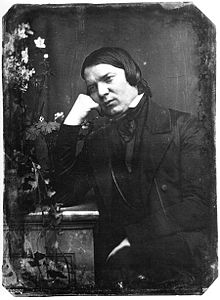 |
One
enduring idea that people often have about
artists is that genius and insanity are
closely linked. It seems like a pretty
self-serving idea, which may account for its
popularity. After all, if people who are
geniuses, and therefore far above the ordinary
orbits of regular folk, are also more than a
little crazy, which is something to which no
one aspires, than at the very least things
come out even. More likely, if a wish-granting
genii could make you a genius but would also
have to make you insane, you could be pardoned
for saying �no thanks!� and preferring to
remain just an ordinary, perfectly
respectable, sane, societally-sanctioned human
being. Now
don�t you feel better about not taking those
piano lessons? No telling where they were
going to lead.
On
the other hand, the myth�s popularity might
have a simpler explanation. People tend to
remember the sensational, not the ordinary.
There have been great gobs of great artists
with perfectly ordinary lives, who at best
seem a little eccentric to their
contemporaries, but who do not attempt suicide
by throwing themselves into rivers, wind up in
insane asylums, and dying there. And then
there is Robert Schumann. Or was.
|
Because he
lived in the 19th century, when medical
diagnoses were often pretty vague, musicologists get
to speculate on what exactly was going on in
Schumann�s mind and body. But he exhibited the
symptoms of a manic depressive, going through periods
of wild exuberance involving great spurts of
creativity�he sketched his first symphony in three
days�and then periods of several melancholy and
depression.
The
fragmentation of Schumann�s mood is reflected in his
own imaginative experience. A frequent writer on
music, with opinions to spare on composers of
performers of the day, Schumann founded a journal and
poured forth review after review. In a famous review
about Chopin, he introduced Florestan and Eusebius,
two distinct sides of his personality. Eusebius, the
poet, reflective and dreamy, and Florestan, the
passionate, exuberant, easily enthusiastic self. Both
of them received musical portraits in Schumann�s piano
cycle �Carnaval� in which figures from Commedia
dell'arte mingle with real persons from Schumann�s own
inner circle.
Schumann�s
liking for the edge is evident in several of his
musical instructions. Some simply require really
bizarre dynamics, where the accompaniment is
intentionally much louder than the melody. Then there
is the famous set of markings on his second piano
sonata, �as fast as possible� followed a page later by
�faster!�
Obviously
the ordinary didn�t appeal to Schumann. He lived in an
age when men were supposed to show strong emotion, and
to weep was a sign of a sensitive and powerful soul.
Dramatic dynamic contrasts abounded, and the climax
was always hair-raising. Composers were often writers,
and philosophers, and had strong ideas about the role
of their art. Before them, the romantic poets had
paved the way, and one of the best-selling books of
the age involved a suicidal young poet.
Schumann�s
life was dramatic enough. Shunted off to law school at
his parent�s insistence, young Robert simply couldn�t
apply himself, and quit. He took piano lessons with a
virtuoso teacher who was training his daughter to
light up the pianistic sky. Robert fell in love with
her; the father-in-law refused his blessing on the
union. Clara was too young anyway, but Robert sued to
marry. It was a protracted battle that the young
couple eventually won. Meanwhile, Robert has ruined
his right hand using a device that was supposed to
strengthen that recalcitrant 4th finger we
all have. It was an age full of such efforts�failures,
all.
The marriage
produced eight children, and seemed very happy, when
one of them wasn�t miserable. Clara did go on to tour
Europe, and become easily the best female pianist of
the age, and possibly the greatest period. Being of a
more refined, Apollonian nature, she probably missed
fewer notes than Liszt and Thalberg, her chief rivals,
even if general audiences might have found her less
thrilling.
But Robert
was having troubles. He tried to conduct an orchestra,
but the rehearsals were a disaster. For all of the
extremely fast tempi that litter his early piano
music, he wanted the men to play slower and slower. He
began to hear the sound of an A in his head that
wouldn�t stop. One note, the ghost of Mendelssohn
dictated to him the theme for a violin concerto. The
only problem is that Robert had already written the
concerto years earlier.
And then
there was the river, and the bridge, and the fisherman
who fished him out, and the asylum where he spent his
last three years. He had cast off his wedding ring and
did not seem to recognize his wife anymore. A young
prot�g� came to visit sometimes. His name was Brahms.
There is a
saying that if you knew how the sausage was made you
wouldn�t want any. Perhaps it is easier to enjoy the
music if you don�t know how much suffering was
involved in its production. Yet much of what Schumann
wrote must have been written during periods of joy and
contentment.
The end was
not happy. Mere mortals can shudder if they like and
thank their stars that they are not geniuses like that
and are not condemned to suffer for it, for after all,
shouldn�t a high price be exacted for the exalted
privilege of making art like that? But whatever our
lot, we have the music of Robert Schumann, and are
richer for it.
|